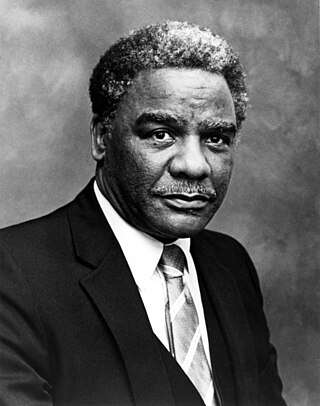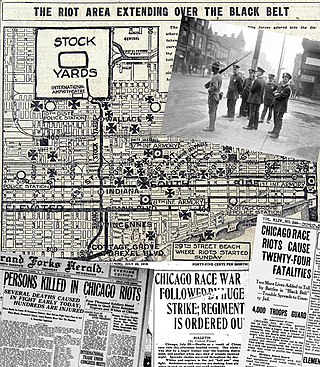
Richard Joseph Daley was an American politician who served as the mayor of Chicago from 1955, and the chairman of the Cook County Democratic Party Central Committee from 1953, until his death. He has been called "the last of the big city bosses" who controlled and mobilized American cities. Daley was Chicago's third consecutive mayor from the working-class, heavily Irish American South Side neighborhood of Bridgeport, where he lived his entire life. He was the patriarch of the Daley family, whose members include Richard M. Daley, another former mayor of Chicago; William M. Daley, a former United States Secretary of Commerce; John P. Daley, a member of the Cook County Board of Commissioners; and Patrick Daley Thompson, a former alderman of the Chicago City Council.

Harold Lee Washington was an American lawyer and politician who was the 51st Mayor of Chicago. Washington became the first African American to be elected as the city's mayor in April 1983. He served as mayor from April 29, 1983, until his death on November 25, 1987. Born in Chicago and raised in the Bronzeville neighborhood, Washington became involved in local 3rd Ward politics under Chicago Alderman and future Congressman Ralph Metcalfe after graduating from Roosevelt University and Northwestern University School of Law. Washington was a member of the U.S. House of Representatives from 1981 to 1983, representing Illinois's first district. Washington had previously served in the Illinois State Senate and the Illinois House of Representatives from 1965 until 1976.
The New Deal coalition was an American political coalition that supported the Democratic Party beginning in 1932. The coalition is named after President Franklin D. Roosevelt's New Deal programs, and the follow-up Democratic presidents. It was composed of voting blocs who supported them. The coalition included labor unions, blue-collar workers, big city machines, racial and religious minorities, white Southerners, and intellectuals. Besides voters the coalition included powerful interest groups: Democratic Party organizations in most states, city machines, labor unions, some third parties, universities, and foundations. It was largely opposed by the Republican Party, the business community, and rich Protestants. In creating his coalition, Roosevelt was at first eager to include liberal Republicans and some radical third parties, even if it meant downplaying the "Democratic" name. By the 1940s, the Republican and third-party allies had mostly been defeated. In 1948, the Democratic Party stood alone and survived the splits that created two splinter parties.

The mayor of Chicago is the chief executive of city government in Chicago, Illinois, the third-largest city in the United States. The mayor is responsible for the administration and management of various city departments, submits proposals and recommendations to the Chicago City Council, is active in the enforcement of the city's ordinances, submits the city's annual budget and appoints city officers, department commissioners or directors, and members of city boards and commissions.

Chicago has played a central role in American economic, cultural and political history. Since the 1850s Chicago has been one of the dominant metropolises in the Midwestern United States, and has been the largest city in the Midwest since the 1880 census. The area's recorded history begins with the arrival of French explorers, missionaries and fur traders in the late 17th century and their interaction with the local Pottawatomie Native Americans. Jean Baptiste Point du Sable was the first permanent non-indigenous settler in the area, having a house at the mouth of the Chicago River in the late 18th century. There were small settlements and a U.S. Army fort, but the soldiers and settlers were all driven off in 1812. The modern city was incorporated in 1837 by Northern businessmen and grew rapidly from real estate speculation and the realization that it had a commanding position in the emerging inland transportation network, based on lake traffic and railroads, controlling access from the Great Lakes into the Mississippi River basin.
Progressivism in the United States is a political philosophy and reform movement. Into the 21st century, it advocates policies that are generally considered social democratic and part of the American Left. It has also expressed itself with right-wing politics, such as New Nationalism and progressive conservatism. It reached its height early in the 20th century. Middle/working class and reformist in nature, it arose as a response to the vast changes brought by modernization, such as the growth of large corporations, pollution, and corruption in American politics. Historian Alonzo Hamby describes American progressivism as a "political movement that addresses ideas, impulses, and issues stemming from modernization of American society. Emerging at the end of the nineteenth century, it established much of the tone of American politics throughout the first half of the century."
Politics in Chicago through most of the 20th century was dominated by the Democratic Party. Organized crime and political corruption were persistent concerns in the city. Chicago was the political base for presidential nominees Stephen Douglas (1860), Adlai Stevenson II, and Barack Obama, who was nominated and elected in 2008.

The history of African Americans in Chicago or Black Chicagoans dates back to Jean Baptiste Point du Sable's trading activities in the 1780s. Du Sable, the city's founder, was Haitian of African and French descent. Fugitive slaves and freedmen established the city's first black community in the 1840s. By the late 19th century, the first black person had been elected to office.
Urban history is a field of history that examines the historical nature of cities and towns, and the process of urbanization. The approach is often multidisciplinary, crossing boundaries into fields like social history, architectural history, urban sociology, urban geography, business history, and archaeology. Urbanization and industrialization were popular themes for 20th-century historians, often tied to an implicit model of modernization, or the transformation of rural traditional societies.

The Cook County Democratic Party is an American county-level political party organization which represents voters in 50 wards in the city of Chicago and 30 suburban townships of Cook County. The organization has dominated Chicago politics since the 1930s. It relies on an organizational structure of a ward or township committeeperson to elect candidates. At the height of its influence under Richard J. Daley in the 1960s when political patronage in employment was endemic in American cities, it was one of the most powerful political machines in American history. By the beginning of the 21st century the party had largely ceased to function as a machine due to the legal dismantling of the patronage system under the Shakman Decrees issued by the federal court in Chicago. The current Chair is Toni Preckwinkle, who is also the elected Cook County Board president.

The Chicago race riot of 1919 was a violent racial conflict between white Americans and black Americans that began on the South Side of Chicago, Illinois, on July 27 and ended on August 3, 1919. During the riot, 38 people died. Over the week, injuries attributed to the episodic confrontations stood at 537, two-thirds black and one-third white; and between 1,000 and 2,000 residents, most of them black, lost their homes. Due to its sustained violence and widespread economic impact, it is considered the worst of the scores of riots and civil disturbances across the United States during the "Red Summer" of 1919, so named because of its racial and labor violence. It was also one of the worst riots in the history of Illinois.

This is a selected bibliography of the main scholarly books and articles of Reconstruction, the period after the American Civil War, 1863–1877.
In the United States, there are several distinct types of mayors, depending on the system of local government.
This is a Mexican American bibliography. This list consists of books, and journal articles, about Mexican Americans, Chicanos, and their history and culture. The list includes works of literature whose subject matter is significantly about Mexican Americans and the Chicano/a experience. This list does not include works by Mexican American writers which do not address the topic, such as science texts by Mexican American writers.

This is a bibliography of Los Angeles, California. It includes books specifically about the city and county of Los Angeles and more generally the Greater Los Angeles Area. The list includes both non-fiction and notable works of fiction that significantly relate to the region. The list does not include annual travel books, recipe books, and currently does not contain works about sports in the region.
The following works deal with the cultural, political, economic, military, biographical and geologic history of the Midwestern United States.

American urban history is the study of cities of the United States. Local historians have always written about their own cities. Starting in the 1920s, and led by Arthur Schlesinger, Sr. at Harvard, professional historians began comparative analysis of what cities have in common, and started using theoretical models and scholarly biographies of specific cities. The United States has also had a long history of hostility to the city, as characterized for example by Thomas Jefferson's agrarianism and the Populist movement of the 1890s. Mary Sies (2003) argues:
At the start of the twenty-first century, North American urban history is flourishing. Compared to twenty-five years ago, the field has become more interdisciplinary and intellectually invigorating. Scholars are publishing increasingly sophisticated efforts to understand how the city as space intersects the urbanization process, as well as studies that recognize the full complexity of experiences for different metropolitan cohorts.

Black Metropolis: A Study of Negro Life in a Northern City, authored by St. Clair Drake and Horace R. Cayton, Jr., is an anthropological and sociological study of the African-American urban experience in the first half of the 20th century. Published in 1945, later expanded editions added some material relating to the 1950s and 1960s. Relying on massive research conducted in Chicago, primarily as part of a Works Progress Administration program, Drake and Cayton produced, according to the Encyclopedia of African American History, a "foundational text in African American history, cultural studies, and urban sociology."

The Chicago mayoral election of 1975 was held on April 1, 1975. Democratic Party incumbent Richard J. Daley was elected to a record sixth term as mayor by a landslide 59% margin over Republican nominee John J. Hoellen Jr. Only one other individual has since matched Daley's feat of winning six Chicago mayoral elections. This was the first Chicago mayoral election since the ratification of the Twenty-sixth Amendment to the United States Constitution, which lowered the voting age from 21 to 18.

The 1955 Chicago mayoral election saw Democrat Richard J. Daley win election to his first term as mayor by a ten-point margin over Republican Robert E. Merriam. This was the narrowest margin of victory of any of Daley's mayoral races.